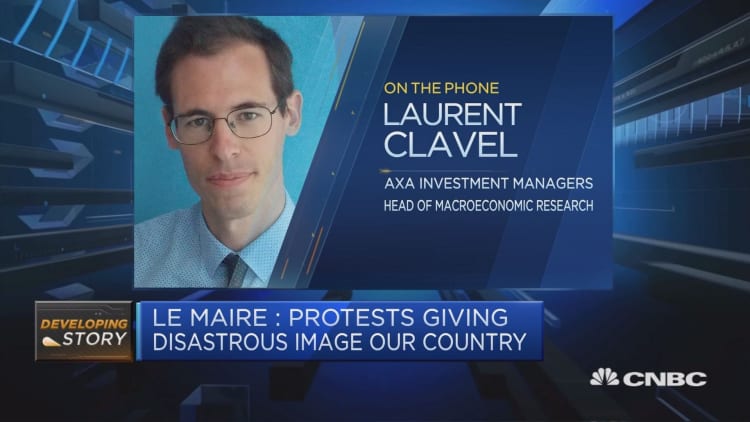French President Emmanuel Macron has pledged to stand firm against "thugs" who have carried out countrywide protests over a recently-introduced fuel tax.
In a speech Tuesday, Macron vowed that violence would not force him to back down over his government's energy policy that has caused upset and division across France.
"I do not confuse citizens and their demands with thugs," Macron said during the televised speech in which he announced new climate and energy policy measures.
In a translation provided by Reuters, Macron added: "I will not concede anything to those who want destruction and disorder."
For nearly two weeks, thousands of protestors have blocked roads and caused huge traffic jams to vent their frustration over taxes on both diesel and petrol that were introduced in 2017.
The Interior Ministry said on Thursday that the unrest had left two dead and 606 injured in France. The authorities attempted to quell the protests using water cannons and tear gas. More than one hundred people have been arrested.
Known as the "gilet jaunes" because of the yellow safety vests they wear, the protesters are not seen as allied to any political party but are instead a mix of working class and rural French who feel President Macron has ignored their needs to bulldoze through his economic reform agenda.
The protesters consider themselves more keenly impacted by a rise in fuel prices as many have to drive to cities or towns for employment.
Faith in France's economic outlook further stuttered on Tuesday as the November Insee (National Institute of Statistics and Economic Studies) reading of consumer confidence dropped three points to 92. That's the lowest figure for that index in three-and-a-half years.
On Monday the French Finance Minister, Bruno Le Maire, said the images of fuel tax protests on the streets of Paris and elsewhere were "disastrous for the image of our country."

But speaking to CNBC's "Squawk Box" on Tuesday, Laurent Clavel, who heads macroeconomic research at AXA Investment Managers said despite the negative pictures, it had not yet affected French growth.
"We are talking about 0.1 percent of quarterly growth maximum, and I would say rather less on this occasion," said Clavel who pointed that these protests weren't affecting oil refineries, or the transport system as had been seen in previous French protests.
Clavel said the protest was more a political than economic problem for Macron who is now less popular at this stage of his presidency than his immediate predecessors Nicolas Sarkozy or Francois Hollande.
In a poll published Friday, just 26 percent of respondents said they were satisfied with the president.
"It is really about how much political capital Macron has left, in order to deliver his economic reforms," said Clavel.


